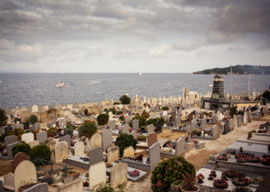
April 27, 2014

St. Tropez. France
Source: Shutterstock
I would hardly have mentioned this if I had not agreed at once. It gave me pleasure to do a good deed, to confer a benefit upon another, that cost me nothing. Moreover I felt as if I were in some way making restitution for my father’s callousness”supposing that my mother’s account of it was true.
There was tragedy too in my mother’s life, more than one. She had been engaged to be married to someone else before her disastrous marriage to my father. He was a fighter pilot in the RAF during the war and was killed in the defense of Malta. After my mother’s death, I found his love letters to her tied up in fading red ribbon. One of them was written on the very eve of his death; and also among them were the telegram from the War Office stating that he was missing in action, another stating that he must now be presumed dead and passing on the Secretary of State’s condolences (a decent fiction), and a letter from his commanding officer, himself no doubt a young man, describing how he had died and how gallant he had been.
These letters were obviously among the most precious (and secret) of my mother’s possessions, and I suspect that she never really got over her fiancé’s death, especially as her subsequent marriage, of which I am the product, was so chronically wretched.
I have known no such tragedies in my life. No one close to me (except a friend when I was 15) has died young. All the terrible things I have seen in life have been from the outside, as it were, not from the inside. My knowledge of tragedy is by acquaintance rather than by experience, as Bertrand Russell might have put it. This has never prevented me from complaining about my fate, not for a minute or a fraction of a minute. But thinking about the death of my wife’s friend’s friend will change all that. From now on there will be no self-inflicted misery or impatience in my life”until, that is, the next time the food in a restaurant takes too long to arrive or a train is delayed by ten minutes.